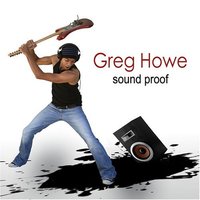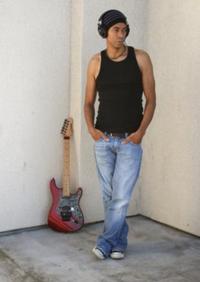Greg Howe, "Sound Proof" (Tone Center)
Women think he's cute; musicians think he's awesome. The bastard. At 44, SoCal superguitarist Greg Howe has been cranking out his own funk-rock-fusion (etc.) instrumental albums for 20 years, as well as performing sideman chores for the likes of Michael Jackson, Justin Timberlake and 'N Sync.
Howe amply demonstrates the awesome part in his new "Sound Proof," one of the greater physical challenges your loudspeakers are likely to encounter. And I do mean loud, cuz if you don't click up the volume, you're gonna miss a lot of the dynamics and details that Howe (who self-produced) built into this little hunk o' nitro.
Badness permeates. The heavyweight "Emergency Exit" hits you like a pugilist, landing a flurry to your face, stepping back for a sec and coming back at ya, again and again. "Walkie Talkie" struts big dirty street funk, squonking wah like a '59 Eldorado about to shiver itself to pieces. Wanna shake yer butt? Try and stop when "Reunion" hops to it with that killin' groove, Latin in form but metal in attitude. The funky blues "Child's Play" storms in with an assault both aggravated and aggrieved.
I mean, even the sensitivity is loud. The slightly reggaefied "Morning View" romances its object with a "Come on, baby" rather than a "Baby, please," all jewels, limos and rum cocktails. Even though there's only acoustic guitar and piano on "Sunset in El Paso," the precision etching of the sound pushed my hapless tweeters past the point of distortion a couple of times -- you didn't think I'd turn down for the ballads, did ya? (Note especially the skillful application of multiple studio reverbs, laying it on thick in the best possible way.)
Howe comes on like a funkier Jeff Beck, shredding when he wants to kick up the energy but keeping both ears on melody and storytelling, his sound both slick and hard. The drums and bass of Gianluca Palmieri and Jon Reshard slam away just right to complement the sometimes complex structures, as on the Zappafied hesitation rhythms and rapidfire riffs of "Side Note." The spotlight moments, though, belong to the limitlessly shaded expressions of Howe and to keyboardist David Cook, who returns from Howe's 2003 album "Extraction." Howe digs Cook enough to grant him half the solo space, and Cook responds with outlandish Latinations, aggressive dissonances and dense Jan Hammer-ish fusitones on electric piano; watch this guy, and hope that he expands beyond his lucrative TV and sideman gigs to make more music beyond his single 2002 album as a leader. (I haven't heard it, but don't be distracted by the Amazon.com customer reviewers who were disappointed that he was not the David Cook who won "American Idol," though he has been involved in the Idol touring machine. The links on AllAboutJazz.com make the same mistake.)
There are some fake phone-message tracks that are funny enough to hear once. The rest of the album you'll want to hear again and again.
I talked to Howe on the phone last year. Ideas pour out of his mouth with the same clarity and cohesion he applies to his ax; dude's a thinker as well as a player.
GREG BURK: What goes on in your head when you start putting an album together?
GREG HOWE: "Envisioning myself sitting in front of the stereo for the first time, and putting the CD in -- and what is it going to take to entertain my ears? When I do it that way, I'm not thinking about licks, I'm not thinking about dexterity, I'm not thinking about effects. I'm just thinking about an overall audio experience that's going to be entertaining."
What motivates your solo work?
"I listen to many kinds of music, including MTV pop. What ends up happening eventually is that an idea will pop into my head that doesn't necessarily come from any one particular direction. It's almost like if you can envision throwing a whole bunch of things into a pot of soup, from different cultures and backgrounds or whatever. Eventually, a new flavor emerges, and you don't know exactly where it came from."
Sounds like you think of genre as a trap.
"That's one of the things that holds people back, or that prevents someone's authentic self from coming out. We're conditioned to believe that whatever you do, it's got to fit within a certain category, it's got to fit within the expectations of whoever you believe your audience is. When I sit down to write an instrumental song, I'm never, ever thinking about a particular genre or style that it should be in. At all. So when people say, 'I love your music because I like fusion,' I'm thinking, 'Oh, you consider it to be fusion? That's interesting, that's cool.' To me, it's just music, the music that appears in my brain."
Do you think more musicians are incorporating a wide range of influences into their playing?
"I do think that it is changing, and I do like to feel like I have contributed to that a little bit. I mean, the stuff that I have done instrumentally is what I would consider to be the true meaning of fusion, which is bringing whatever your influences are to your own brand of music. I like things where the guy is bringing something fresh to the table, something I haven't really heard before."
Some musicians get frustrated with the niche they've carved for themselves, but you don't fall into that.
"It's a conscious effort not to. I can see how easy it would be, because the industry tends to pressure you to do that. It's safer, it's already been proven. I think for record labels, it makes it easier to market things. Record companies want to be able to say, 'When your record comes out, we want to know if it's going to be in the rock section or the pop section or the R&B section or the jazz section, so we can market it. If we can't define what you are, then we don't know what to do with you.'"
When you were learning to play, did you have a goal in mind?
"I come from more of a rock place. Watching Van Halen and some of those guys from the late '70s and early '80s jump around onstage -- that was cool to me, because it meant, that's an easy way to get girls. I won't have to have any game, I can just kind of do that. But eventually what happens is you fall in love with it, and music did sort of take over my life, and it became a priority for me. To express myself musically became not even something that I wanted to do, it became something that had to take place."
And you had the drive to follow through.
"That's always been a part of my nature -- always. I've been the kind of person that if I get involved in something, I always grab hold of whatever it is passionately. There've been some bands that I've produced, and they'll look at me midway through the project and go, 'Man, you're treating this like it's your project.' In a certain way, it has become my project. That's just the nature of my personality. I don't know if it's good or bad."
What's your attitude toward technique?
"In the past 15, 20 years, so many guitarists have learned to do the things that at one time were considered to be outrageous techniques. Really, the things that blow me away about other guitar players almost never have anything to do with technical facility. It has to do with almost everything but that. So I really envy the guys who have the ability to move me that hard. I'd love to have that. There'd be a lot less training involved if somehow I could implement these other less tangible qualities into my playing. There are certain guys like Robben Ford, who can just floor me with three notes. And I know it sounds cliché, and it sounds old and corny, 'cause we've all heard people say that, but it really is the truth. It just depends on what you consider to be technical ability. I think that it's everything. We tend to think that it means the ability to run up and down the fretboard fast or whatever, but I think vibrato, and a lot of things that are more subtle . . ."
Who are some of the guitarists you're talking about?
"Oh man, there are so many guys. Obviously Hendrix, Stevie Ray Vaughan, McLaughlin, Holdsworth. I went through a McLaughlin phase and a Holdsworth phase. And when I say I went through that phase, I don't mean that I graduated from that -- I went through a phase of really listening to them constantly, and still return there sometimes. To me, Allan Holdsworth is in a league by himself, and the thing that he possesses as an artist -- and this is important to me -- he's got his own thing. There's no one really who competes with what he does, because there's no one else that really does it at all. And that's what I love about him, more so than how amazing he is, but what I love is that he is a true artist in the sense that you can't get that across the street, you can't get that anywhere else except from him. His whole musical package is a complete statement that will never be repeated or even emulated."
Do you listen to any metal players?
"I went through an Yngwie Malmsteen phase back in the day. He's another guy who, love him or hate him, he almost single-handedly created a whole genre of music, or at least guitar-playing style. It's been copied and emulated by tons of people. And regardless of who has copied him or how good they've done it, or how much further they've taken it, no one can really deliver it like that. He's still the best at that thing, in my opinion. There's a passion that's connected to his playing, that's deeper than just the technical execution. There's another element that's intangible, that can't be emulated."
Do you think some people are born with more natural ability, quicker reflexes?
"Absolutely. I've seen it a million times. And there are a lot of people out there whose fingers can do things that mine can't. And one of the reasons that I have a style of playing that sounds a little different than other people is because a lot of the things that I've come up with on the guitar are the result of me being unsuccessful trying to emulate other things. So in my quest to do what I hear on some other album of one of my favorite players, and being unsuccessful, I'll stumble across some other thing that's working great for me, and that I would never have thought to try had the original attempt gone okay."
You're still having fun discovering things.
"All the time. Every single day. A lot of times when people ask me about a lick or something that I did 12 years ago, I actually don't remember what I did. And when I analyze it, I'm like, 'Wow, I don't do this anymore, I need to do this again.' Because I'm always trying to evolve, and always trying to keep things feeling fresh for me. It's really difficult for me to just hear myself sounding the same way that I sounded two years ago. That's where things start to become sluggish and uninspired. I'm always reaching for new things."


